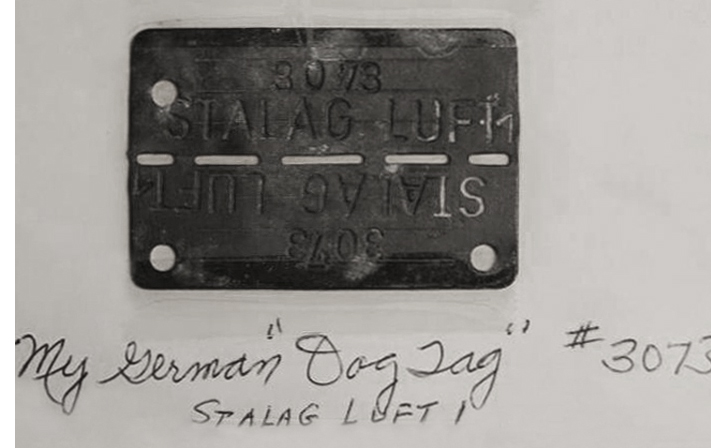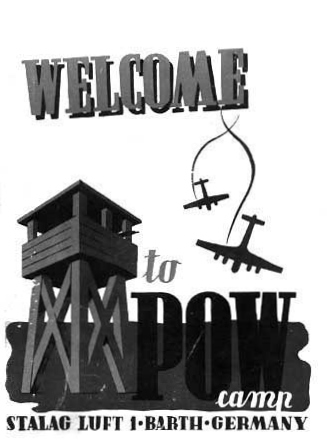
For the next fifteen months, Stalag Luft 1 would be home. The YMCA sent log books for the men to record their experiences. Fortunately, Art's survived his captivity. A lot of his story is recorded in his log book, and we will include much of it here.
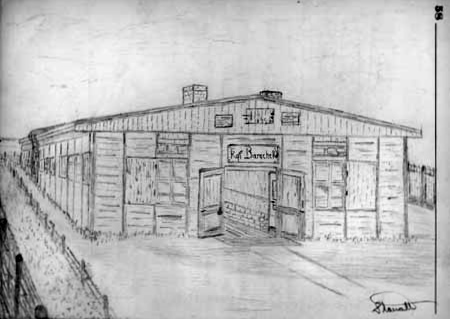
Upon arrival, the new "Kriegies," short for Kriegsgefangenan (Prisoner of War), Art, George, Walter, and, ultimately, Jim were assigned to Barracks 10, Room 6, in North Compound 1. Art had fifteen roommates assigned to a room about the size of an average den. The barracks was on blocks about two feet off the ground. During the winter, the snow would blow through the floor and walls. The room was lined with bunk beds each with a mattress that consisted of a burlap sack filled with wood shavings. Three wooden slats supported each mattress. The men slept in their clothes. Showers were taken in groups with short bursts of rationed water.
The Red Cross provided parcels of food for the POW's in addition to the broth and Schwartz brot (black bread) the Germans provided. Art became the bread ration officer, and, as so, was responsible for distributing cartloads of this German staple in the camp. One day, a loaf fell off the cart, and the wheel of the cart rolled right over the loaf without making a dent. A good portion of this bread was sawdust. A Red Cross parcel was shared by four men, and would contain a box of prunes or raisins, 1 can of Klim (condensed milk), a D-bar, cigarettes, crackers and 1 can of SPAM. The four men comprised a "food combine". Each combine was responsible for dividing their food rations and for preparing their meals. The four members of Art's combine called themselves "the Baron, the Moose, the Pig, and the Brain (Art)". Since Art was the salesman in the group, he would trade with others for needed ingredients.
These are some of their recipes that Art wrote in his YMCA log book:
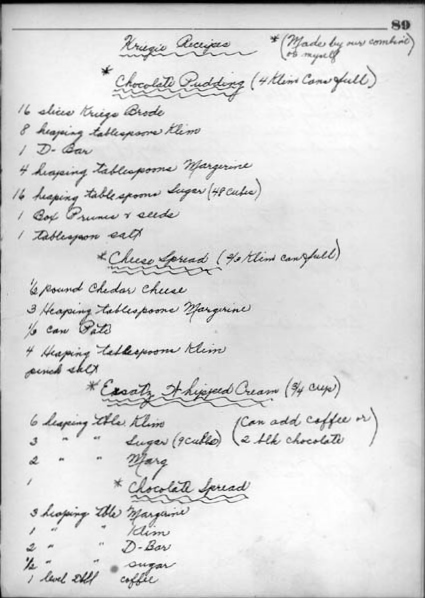
There was nothing required of a POW except to make roll calls. The key to survival for Art was activity. There were a number of camp events. Art attended them all.
Art also enjoyed poetry. He recorded a number of the classics and other favorites in his log book. One, in particular, comes to mind. The author is unknown:
The Combat Crew
Ten men, minds molded into one
winged off toward the rising sun.
Each with his separate job to do
but taken together, a combat crew.
What thoughts are theirs while roaming on high,
to the portals of hell in the distant sky.
Thoughts of loved ones on a distant shore,
or memories of other raids flown before.
Or do they ponder with baited breath
if the rendezvous may be with death.
Each is entirely himself unto,
but taken together, a combat crew.
Sailing deep to the heart of the enemy
through miles above the land and sea
individuals all in a lumbering crate
till the skies seem suddenly filled with hate.
Red and black are heavens once blue
with flak and fighters now shot through.
And now those few in their fragile kite
become thirty tons of solid fight.
"Bombs Away" and the real job's done,
but their trip thru hell has just begun.
Back to the channel fighting their way
hoping their number's not up that day.
Then the flak is behind them and the fighters are through
and once more skies are clear and blue.
Then their grand old ship becomes once more
just a battle scarred crate and her crew of ten.
Ten individuals, no longer one
limps back toward the setting sun.
Each man with his separate job to do
as once again they return from the blue
But to Jerry's regret with each rising sun,
these cussing fighting sons of guns
carry the fight to him anew
and become once more a combat crew.
There was a baseball league with teams named the "Baltic Bums," "Flying Forts," "Homeless Ten," "Klim Cats," and so on. Art's team, the "Repats," was part of the Ivy League which included other teams like the "Hitless Wonders," "Miracle Men," and "Slackers." Art and Jim Ellis played right field, George Killduff pitched, and Walt LeClerc played short stop. The Repats were in second place.
There was a library at Stalag Luft 1, and Art made full use of it. Art read over one hundred books while in captivity. There was a camp orchestra in each compound, and a number of concerts were given. The orchestra for North Compound 1 called themselves the "Round the Benders". Art, Jim Ellis, and Walter LeClerc are pictured at a fourth of July concert. The German in the foreground, wearing the white hat and sunglasses, was known by the Kriegies as "Joe Bananas."
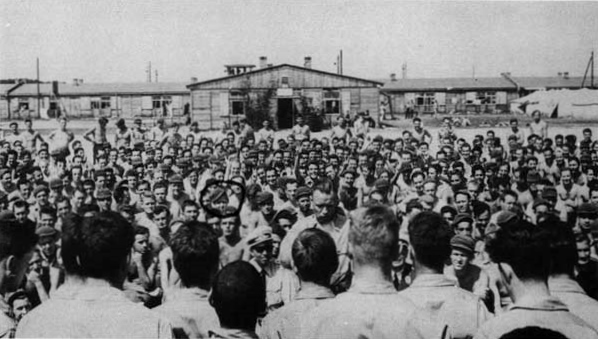
4th of July concert, North Compound 1
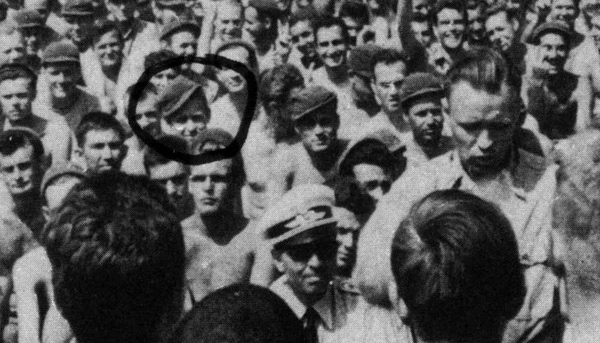
Art (circled), Jim Ellis, Walter LeClerc, "Joe Bananas" in foreground
Art also attended lectures on military campaigns and other topics of interest given by other officers. He gave a seminar, himself, on the art of selling. Some of the Kriegies put on plays. Art played Sarah in "The Man Who Came to Dinner". His logbook lists the cast.
Life as a P.O.W was not easy for anyone, but Art found humor in most events and people. In his spare time, he drew cartoons of Kriegie life, and recorded actual letters others had received from home that have to be read to be appreciated. He calls them morale builders.
For example:
(A complete letter)
Dear Son. Hello! How are you? We are well! With love from all, Dad.
Dear Nephew,
I'm enclosing a calendar. Thought it would come in handy, as it has several years on it., Aunt ___
Dearest,
When you get back, I would like a divorce. I'm living with a cadet in Santa Ana, Cal. And I'd like to marry him. He's a wonderful fellow and I know you would like him.
For more: Link to morale builders.
Art recorded quotes that became part of camp life such as, "Goon Up", a warning that a German was approaching, "Ferrets", Germans who would crawl under the barracks, and listen to conversations regarding escapes or other information, and so on. Speaking of Ferrets, to discourage the practice, the Kriegies would often pour hot water through the floor when they suspected they had discovered a ferret. This happened once in Art's barracks. The doused ferret shot up through the floor sending the Kriegies scurrying to the walls for safety.
Not all of the guards were hostile. One, named "Joe Bananas" by the Kriegies, stayed with the POW's when the camp was liberated, and was hidden from the Russians by the Kriegies so he could surrender to the Americans.
There were always escape attempts going on. After a heavy rain, many of the tunnels would collapse leaving trenches in the campgrounds. The Germans, upon discovering a new tunnel, delighted in displaying their victory to the Kriegies. Art remembers a morning roll call when some Germans paraded a sign before the formation, including a black wreath, stating "Tunnel #804 ist KAPUT!"
Inspections were routine. The Germans wanted most to discover radios that they thought were operating in the camp. Incredibly, the Kriegies had succeeded in assembling a secret radio that provided them with news from the BBC. That news was then printed up in the camp newspaper called POWWOW (Prisoners of War Waiting on Winning) which was then passed through the camp, and read silently at night in each barracks. The Germans were never able to silence POWWOW.
Art busied himself with a laundry business, trading items between Kriegies for cigarettes, playing volleyball, writing letters to home, and participating in any camp event. There were boxing matches in the camp including a challenge match with the senior POW officer, Colonel Hubert Zemke.
One night, the mess hall burned down. Art noticed Kreigies opening windows so the wind would fan the flames. No one ever learned how the fire started, but from that point on, the food would be rationed out to the barracks, and the mess hall cooks, no longer needed, were soon as thin as the rest of the men in the camp.
Air raids were a great source of amusement for the Kriegies. Once, there were two German airplanes (trainers) flying above the camp when a British Mosquito appeared, and attacked them. The Mosquito was a twin engine fighter with a light wooden frame. Known for its speed and maneuverability, it quickly shot down the two German planes to the delight and cheers of the Kriegies below. After that, the Germans did not allow any Kriegies to remain outside the barracks during air raids. One POW was shot and killed for not returning to his barracks quickly enough.
After the battle of the bulge, there were no more Red Cross Parcels. Art weighed less than 115 lbs. at this point. It became commonplace for a prisoner to black out from standing up too quickly. Many men would have to be helped to roll call.
One day, Max Schmeling, entered Art's barracks along with the rest of the "Wheels" on a "goodwill" visit to the camp. He shook hands with Art, and used his pen to sign autographs. Art said he always thought his own hands were big until he shook hands with this famous German boxer. Schmeling's parting words to the POWs were, "Good luck. See you in New York. It won't be long now."
Then one night, the Germans simply left. The camp senior officers took over with Colonel Zemke as Commander. Just in time, as it turned out for a Colonel Spicer who was in solitary awaiting execution by the Germans.
Art was no longer a POW.
